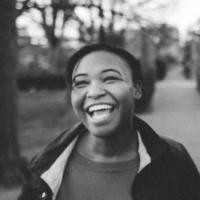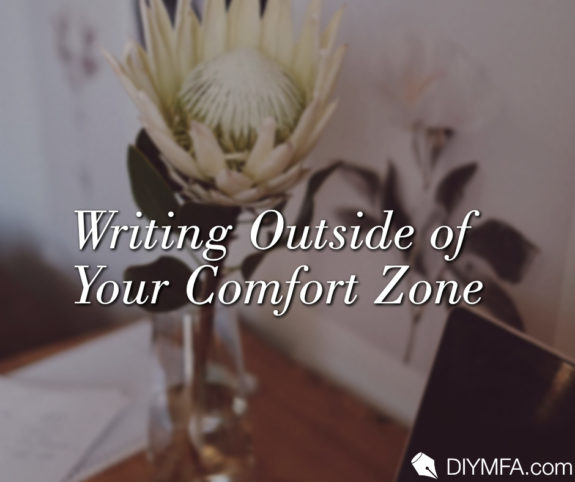The world is a mess right now. The United States is a mess right now. And we cannot pretend like what has been happening and what’s continuing to happen isn’t happening. And I just wanted to name that here before going any further. Everyone has the right to engage in social justice in different ways, and if one of the ways you engage is through creating and continuing to live in spite of the current state of things, then I offer this article to you. This is one of the ways that I engage: by writing outside of my comfort zone.
When it comes to fiction and what I write for public consumption, the subject matter is typically cathartic. A way for me to wrestle with my feelings about the human condition, how we treat each other and the consequences of that treatment. Which, in times like these, can be very hard to continue to sit in without affecting my mental health. So, I make an attempt to write outside of my comfort zone and engage with my emotions, my feelings in a different way than what I’m used to. Not only does it give me a bit of a break from my usual routine, but it also helps open me up and expand the boundaries of how I think and how I create. And that, in turn, works wonders for both my writing and for me as a whole person.
For this exercise, there are three steps that I follow to help me wade into the uncomfortable and write something outside of my usual routine:
First, I choose a genre.
To start off, think of all the genres you typically write in and even enjoy reading in. For me, that includes most things under the speculative fiction umbrella from science fiction to dystopian to horror and thriller. (See? A very “fun” headspace for the current climate.) Once you’ve done that, figure out what all of those genres have in common and how you use that in your writing. When I look at each of the genres I’ve listed, the main theme running through each of them is the giving of a social commentary of some sort. And that is exactly what I do and what I aim for in each of the pieces I write in these genres.
After identifying the why behind what you usually write, take a moment and list out the genres that you not only don’t typically write in, but the ones you wouldn’t want to write in, for whatever reason. Genres in this category for me include Comedy and Romance, and it’s not because I don’t like these genres. They’ve just never been the ones I’ve gravitated toward as a writer and I don’t feel that I write them very well. Which means they are perfect for getting me out of my writing comfort zone.
Second, I choose a circumstance/situation.
Now that you’ve chosen your genre, try thinking of a circumstance or situation that you typically write when it comes to your stories. This could be anything from an extensive scene between multiple different characters, to a small and subtle brief moment in time between only a few characters or as little as just a single character. What do you find yourself most drawn to writing? I tend to gravitate toward scenes where two characters are essentially trapped in a room together with a decent amount of tension already present between them. Typically, the tension is due to either something having previously gone wrong for one or both of them, or the pair of them are trying to figure something out.
Once you’ve chosen your circumstance, begin fitting it into the genre you’ve chosen. So, if I choose Romance, I’ll go ahead and change my “room” from an interrogation room, for example, to an elevator in an apartment building. And I’ll change the tension in the “room” from something like trying to figure out the intricacies of a potential government conspiracy, to long-held, pining feelings for the other person they’re trapped with. Not only does this work to completely push me outside of my writing comfort zone, but it also challenges me to think of how I write in a completely different and new way.
Third, I choose my character(s) and their world.
Whether it’s something you’ve long established in previous works, or something completely new, decide on which character you’d like to see in this particular circumstance and genre, and what world you’d like them to belong to. And don’t think you have to limit yourself to keeping your character and the world they were established in together, especially if it doesn’t really work for the new genre you’ve chosen, or if it simply just doesn’t inspire you. For example, I am much more inspired by the idea of exploring romance for Abigail, the main character of my novel, in a fantasy world rather than the dystopian wasteland she hails from.
Now that you’ve got all of your elements together, it’s time to start writing or really just thinking. But take it slow. The whole point of this exercise is to inspire you and your writing to get outside of your usual spaces. To give you a chance to play with new and different ideas and to be open to them in the hopes that someday you can begin to incorporate them into your regular writing and continue expanding your ideas and the way you think. The need for that has always been and will forever be necessary both in our writing and our everyday lives. Especially to achieve any kind of the change we seek.
As writers and as people, we must find our place amidst the current chaos, and dare to choose to be and be made to reach outside of our own comfort zones.

Jenn Walton is a writer, editor and storyteller based in Washington, D.C., whose fiction works are housed mainly in the speculative genre. She has completed her first novel project that explores, through the lens of a failing utopia, what happens when society gives in to its fear of the other. She previously wrote for a communications firm where she drafted and edited sponsored and organic content for top-tier academic institutions, Fortune 500 companies and leading philanthropic organizations that has run in The Washington Post, USA Today and the Atlantic. For more from Jenn, please visit her at her website or on Twitter.







